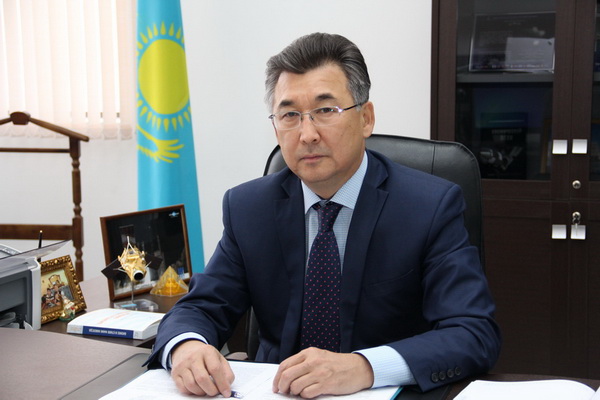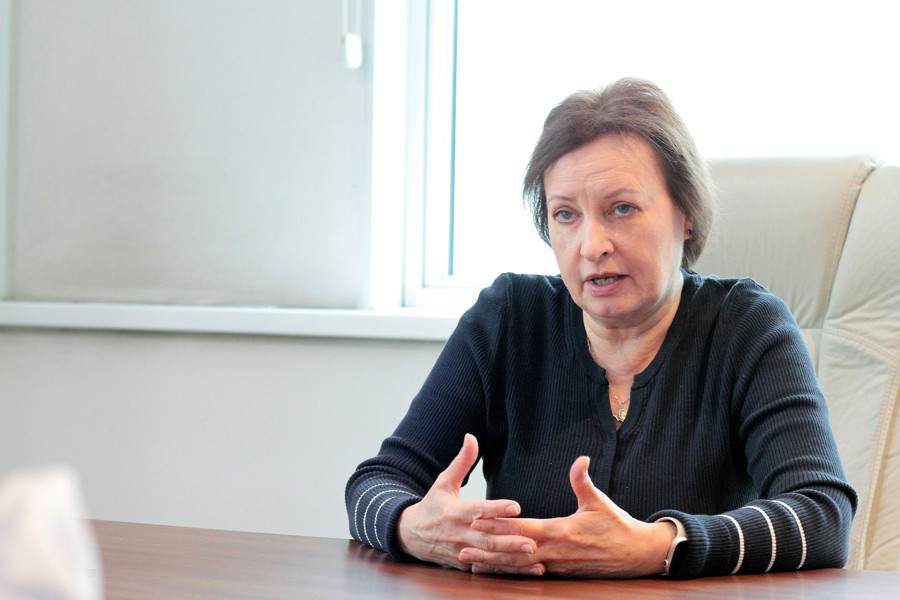Kazakhstan’s Deputy Minister of Defense and Aerospace Industry Marat NURGUZHIN:
THE SPACECRAFT ASSEMBLY AND TESTING COMPLEX IN ASTANA IS TO BE LAUNCHED AT THE END OF 2018

The 5th International Exhibition of Weapons Systems and Military Equipment KADEX-2018 will be held, by tradition, in May 2018 in Astana. For the first time there will be a space industry pavilion at the exhibition. Kazakhstan’s Deputy Minister of Defense and Aerospace Industry Marat NURGUZHIN talked in an interview with Interfax-Kazakhstan about preparations for this event and about plans for the development of the domestic space industry, as well as objectives for 2018.
- Marat Rakhmalievich, tell us what are the main objectives set for the ministry in the space field in 2018?
- This year a number of large-scale objectives are set for the ministry. These main ones I can name are the commissioning of the facility to assemble and test spacecraft -SbIK KA - in late 2018. It should be noted that this plant for production of space vehicles would allow the domestic space industry to reach a new stage of development. The enterprise would carry out the entire operations cycle, from designing to assembling and testing satellites with weights ranging from 100 kilograms to six tonnes, as well as manufacturing satellite components. At the end of last year, the opening of one of the SbIK KA facility main units - the specialist space hardware design and engineering bureau - took place, main construction works are nearing completion, and all technology equipment at the SbIK KA testing sections was manufactured and successfully passed shop tests and was delivered to Astana. The SbIK KA commissioning is planned for the end of this year.
Another objective for this year is the launch of space system satellites for scientific and engineering purposes. The scientific-technological space system consists of two spacecraft and ground facilities. Currently the satellites have been manufactured and are undergoing final tests. Their launch is planned for the third quarter of 2018 from the U.S. territory on board a Falcon-9 launch vehicle.
- Last year Kazakhstan's analogue of the Russian ERA-GLONAS system - EVAK - was launched in test mode. When is it to be launched into commercial service?
- First of all, I would like to note that the main objective for emergency calls in case of accidents and disasters (EVAK) is to provide conditions for reducing the fatality rate on highways by creating an efficient system for calling emergency services during road accidents and any other emergency. Thanks to this system it is planned to cut the time it takes to inform special services about road accidents so that aid is provided to the injured within the so-called 'gold hour,' when medical aid is most efficient. EVAK was created completely on the basis of designs of the country's scientists and would operate using signals of the global GPS and GLONASS satellite navigation systems. As for industrial utilization, yes, currently this system is operating in test mode, by the end of this year it will be launched into commercial service.
- It is known that the first rocket launch from the new Baiterek space rocket complex is planned for 2022. What work is currently being done to implement these plans?
- The project on creating the Baiterek space rocket complex is being implemented jointly with Russia. The Russian side is responsible for creating a Soyuz-5 middle-class carrier rocket new generation and the Kazakh side is responsible for upgrading ground infrastructure on the basis of the existing Zenit-M space rocket complex. Indeed, the first rocket launch from the Baiterek launch pad is scheduled for 2022. To date, a roadmap for the Baiterek project for 2017-2022 has been approved, and works on devising a feasibility study for the project have begun. In 2018 it is planned to hand over the Zenit-M launch pad facilities based on Sites 42,43 and 45 at the Baikonur Cosmodrome to Kazakhstan and organize their utilization jointly with Russia.
- This year, for the first time the Ministry of Defense and Aerospace Industry will oversee the organization of the KADEX exhibition. Will KADEX-2018 be different from previous exhibitions? What results do you expect from the exhibition?
- Yes, indeed, KADEX will be held for the first time this year under the aegis of our ministry. Domestic and foreign enterprises of the defense-industrial complex and space industry, leading design bureaus and research institutes will participate in the exhibition. This exhibition will differ from the previous ones in a way that a separate pavilion for the space industry will be set up. Also the Space Days in Kazakhstan International Forum will be held as part of KADEX-2018, the business program of which in a format of plenary and section meetings, conferences and round tables will allow experts from various countries to exchange views on topical issues of the development of global space activities. The forum will host the Eurasian Aerospace Congress Conference entitled “Modern Trends in International Cooperation in the Aerospace Field." The exhibition visitors and participants will be able to familiarize themselves with the latest achievements and promising scientific inventions of the defense-industrial complex and space industry enterprises. All that should be resulted in the conclusion of hands-on mutually beneficial contracts, the signing of agreements and memoranda, which in turn would promote the development of partnership in the field of military-technical cooperation, cyber security and space exploration. The exhibition will be held from May 23-26, 2018 in Astana, it will be open on May 25-26 for a wide range of visitors.
- Kazcosmos celebrates its 25th anniversary this year. Can you name Kazakhstan's achievements in the space field over the past quarter-century?
- I would like to especially underscore that over this time the fundamentals of a new branch - the science-intensive high-tech space industry that has never been in Kazakhstan before – have been created from scratch. Over these years, a lot of work has been done: The safeguard and restoration of the world-famous Baikonur Cosmodrome capacity have been ensured; the country's existing space infrastructure has been systematized. Enterprises have been set up across all the strategic development areas of the space activities. A lot of time-consuming work has been done to form the qualified core of the scientific and engineering staff of the space industry enterprises.
In addition, the two orbital batches of spacecraft have been manufactured, launched and put into operation.
Within the framework of establishing international cooperation in the field of space exploration and use of outer space for peaceful purposes, partnership has been established with the leading space powers, including Russia, Ukraine, France, Germany, China, India, the UK, Israel, the Netherlands, Sweden, Japan, South Korea , Thailand, the UAE, Saudi Arabia and Iran.
Certain work has also been done in the field of legislative support for the space field activity.
As you already know, currently the project on creating the Baiterek space rocket complex is being implemented, which would allow Kazakhstan to safeguard the Baikonur Cosmodrome prospects and enter the global commercial launch market.
A lot has been done and now it is necessary to ensure the effective use of created modern space infrastructure to provide solutions to the economic sectors in order to meet their growing demand for space systems products and services.
As it is said, human resources are key and we have enough valuable staff. The issue of professionalism, continuity of traditions in the space industry is of paramount importance. Our current personnel potential has been supplemented by young specialists, many of whom were educated by the previous generation and are trying to catch up the whole of their experience and knowledge. The main thing is that love for our cause and desire to turn Kazakhstan into a space power unite all of us.
- Thank you for the interview!
February, 2018
© 2026 Interfax-Kazakhstan news agency
Copying and use of these materials without reference to the source is prohibited
Archive





